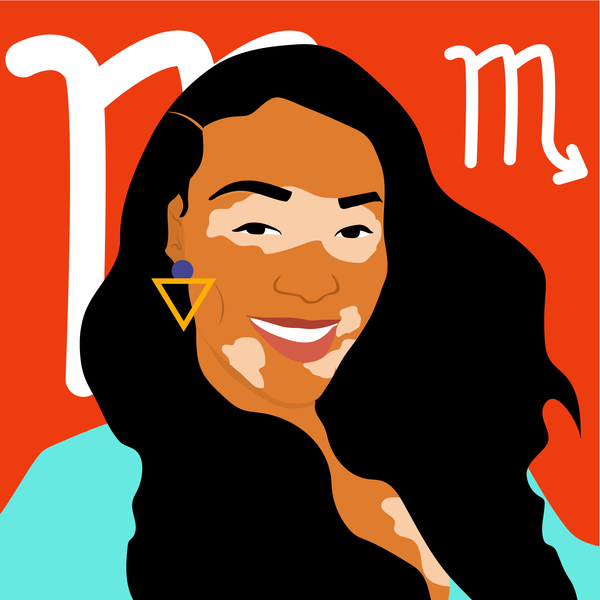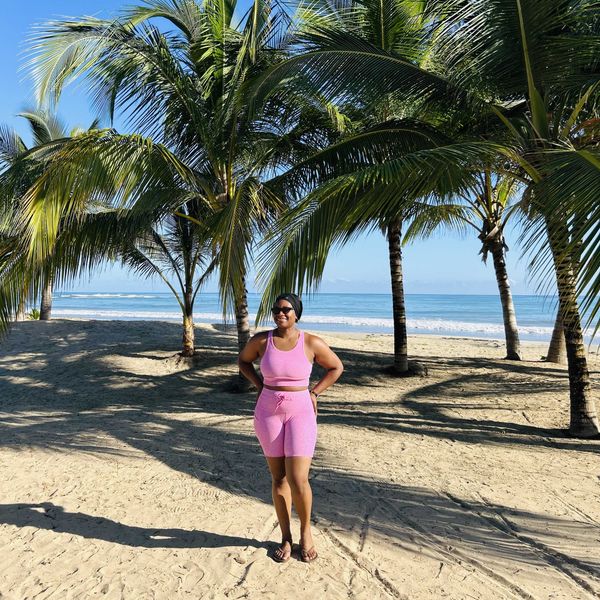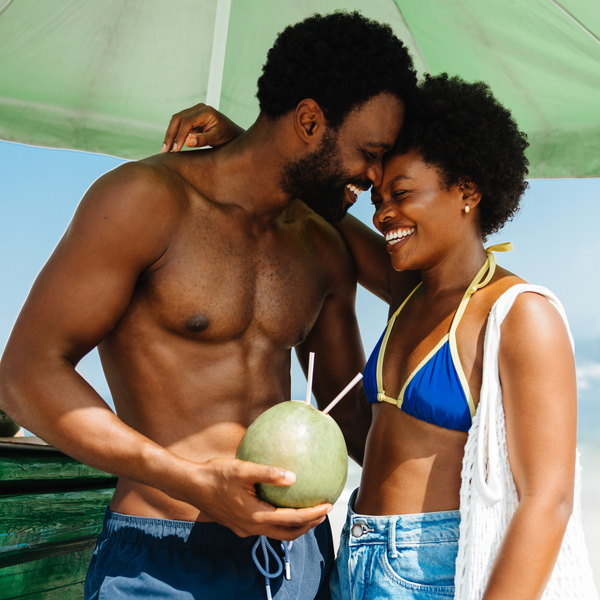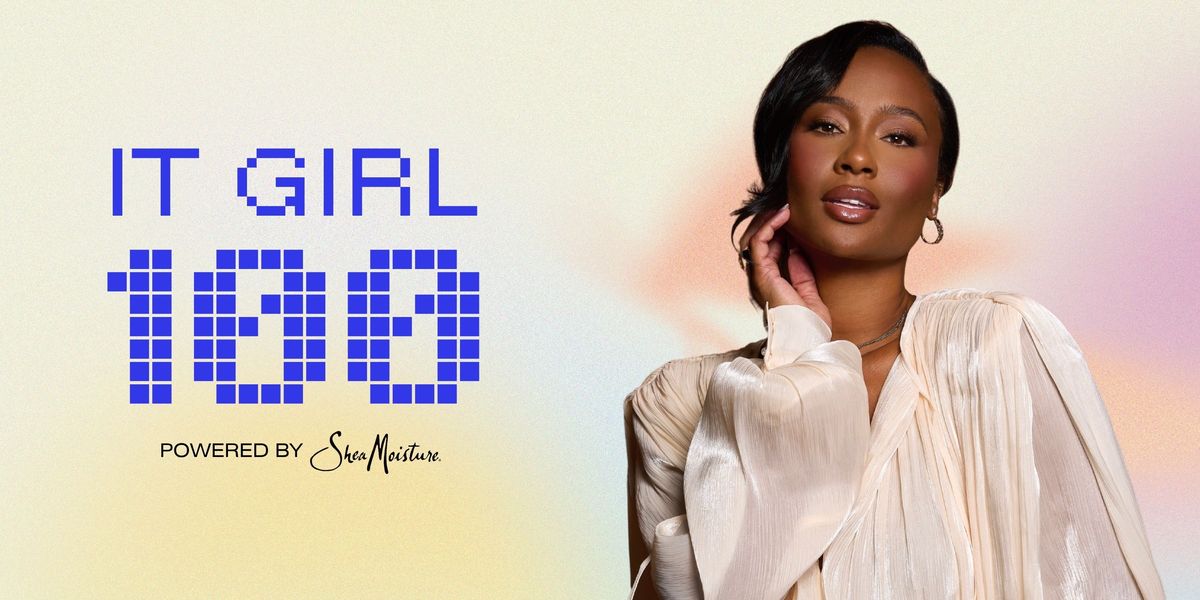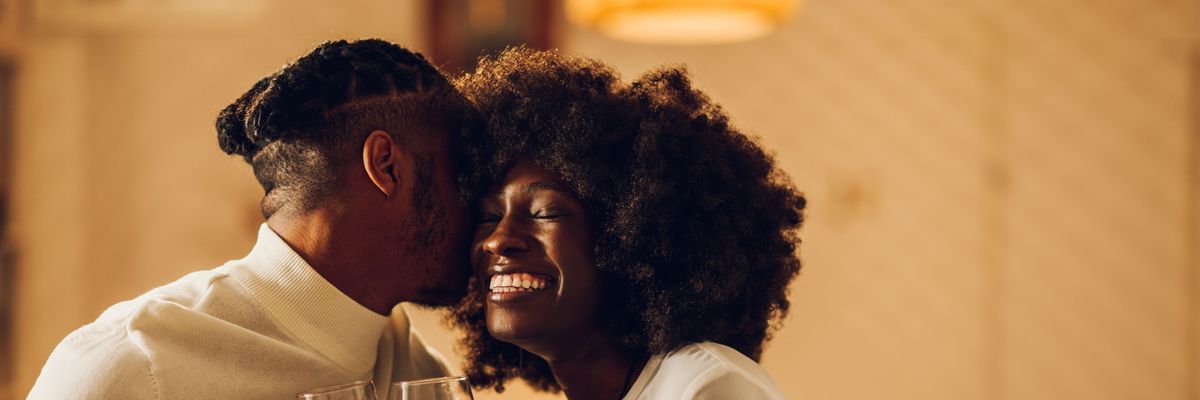
Here's something many Black folk don’t always see us doing—but we absolutely should: camping. Yeah, I know. Bugs, wild animals, dirt, and no WiFi? That Black camping itinerary might sound like the start of a horror movie, right? But hear me out.
Many of us may have grown up thinking camping was something we just don’t do, and we have good reasons to decline or be apprehensive. I mean, none of us, our parents, nor our ancestors grew up jumping for joy to add a sprinkle of redlining, discrimination, exclusion, cultural disconnection, and access challenges to our outdoor recreation activities, right?
Well, I’ve been on safaris in South Africa, hiked waterfall-lined paths in Jamaica, and enjoyed sunset tequila tastings at high-end Mexican resorts, but camping? It was definitely a surprisingly fun 10-out-of-10 adventure I’d gladly embark on again. When Kampgrounds of America (KOA) invited me to join a Black camper’s retreat hosted by Black People Outside at the Cape Charles Chesapeake Bay KOA Resort in Virginia, I couldn’t say no.
I mean, while camping for some of us might be a hard pass, for me, it was an opportunity to reconnect with a childhood memory, try out glamping in a state-of-the-art camper, and see a part of Virginia that I didn’t grow up visiting as a child in the Hampton Roads communities my maternal family called home back then.
RISE IN INTEREST: Black Folk Camping And Creating Safe Spaces
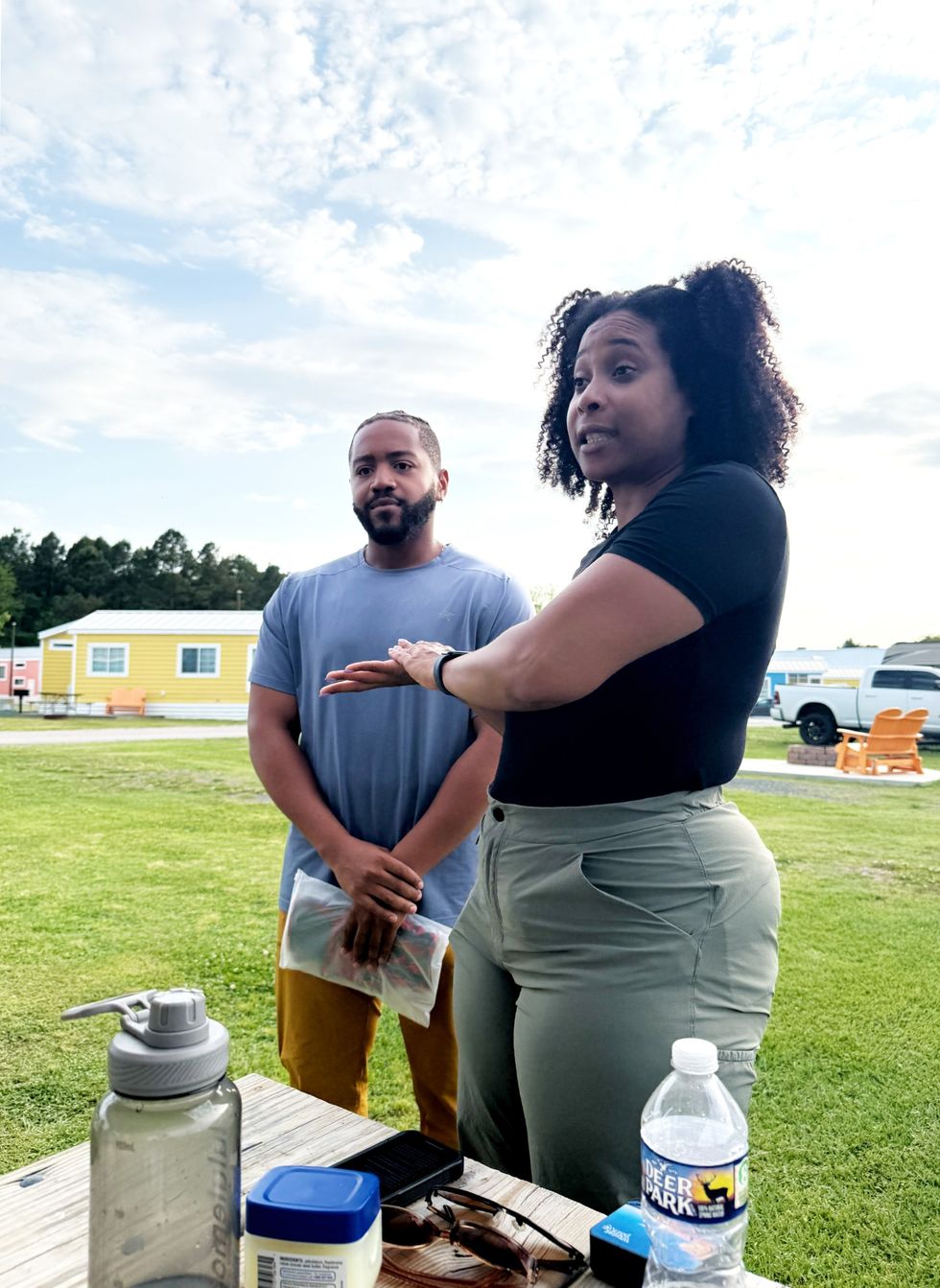
Kameron Stanton, left, and Chevon Linear, founders of Black People Outside
Courtesy
And my adult curiosity and affinity for the outdoors are shared by a growing number of my peers. Black people made up 14% of campers in 2024, an increase from 11% in 2019, according to a recent KOA report. There’s an emerging trend of Black campers taking on nature-centered adventures like skiing, foraging, hiking, and van dwelling.
We’re definitely not new to this, but certainly true to it—from author and anthropologist Zora Neal Hurston to pioneering park ranger Betty Reid Soskin to Outdoor Afro founder Rue Mapp to the many other women who have boldly advocated for liberation, inclusion, and exploration in outdoor spaces.
And with Black People Outside, founded by Chicago-based couple Kameron Stanton and Chevon “Chev” Linear, the Black camping experience reflected something that happens whenever we show up to the party: cultural connection, unapologetic fun, good vibes, and our own unique flair for soul-stirring memories. I enjoyed a luxe VIP stay in a Platinum Salem RV among the who’s who of media, and it was divine.
So, whether you’re looking for a reset in a world where we’re constantly navigating microaggressions and systemic stress, or you just want something fun and off-the-beaten path for your next travel rendezvous, take a nod from this camping itinerary, perfect to celebrate Black joy and community:
WHERE I STAYED: Glamping In A Luxury RV Rental In Cape Charles, Va.
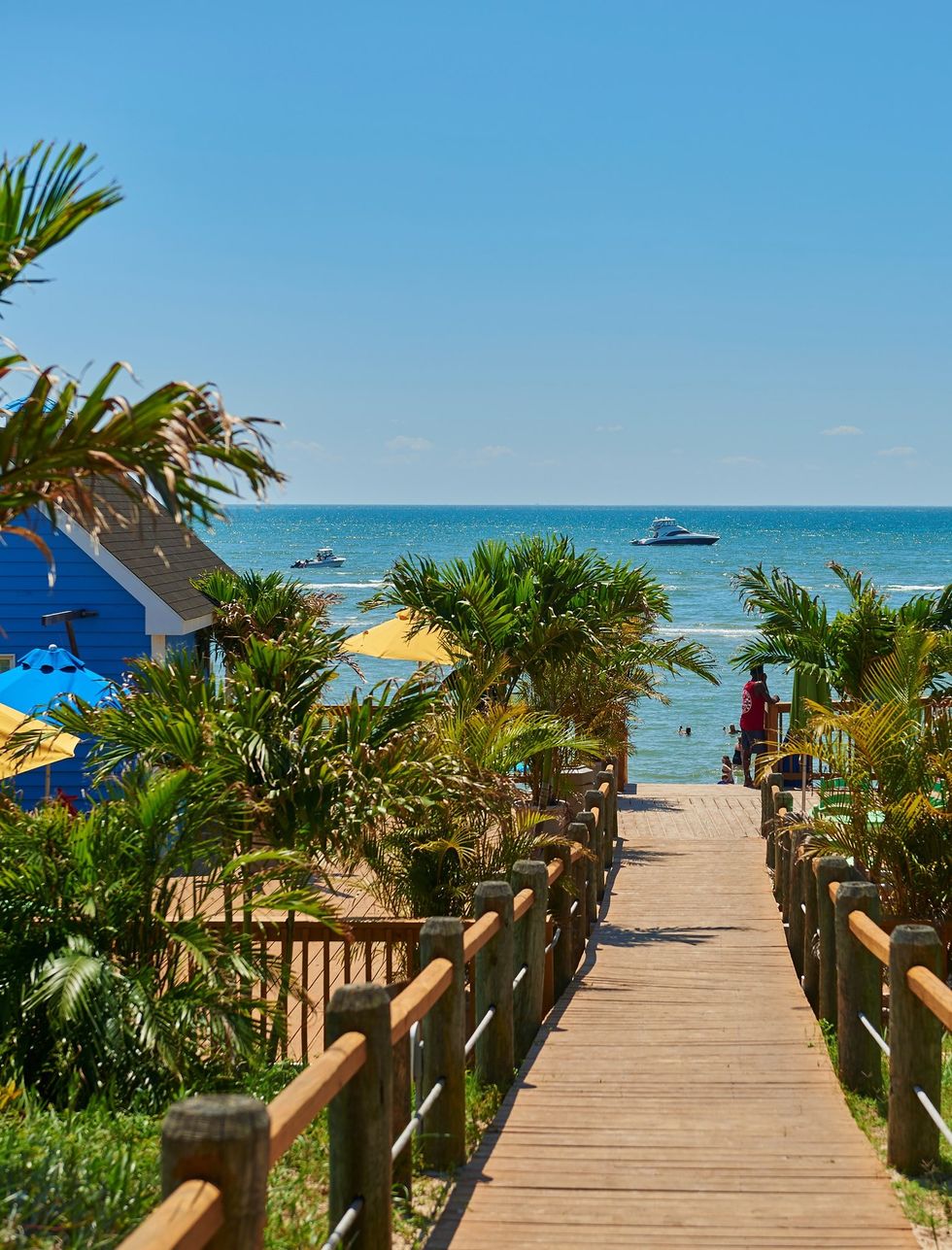
The beach side of Kampgrounds of America's Cape Charles, Va. property
Courtesy of Kampgrounds of America (KOA)
For this trip, I stayed in a Salem Fsx Platinum RV that was rented via RVShare.com. (Think of it like the Airbnb of camper rentals.) You basically filter for the type, location, and other amenities, and you book the camper.
With KOA, you can visit their website or use their app to find a campsite for parking the RV among one of their more than 500 campgrounds across the U.S.
You can have the RV delivered to the KOA campsite of your choosing (depending on the rental, host policies, and rates). I highly recommend letting the host set it up, especially as a newbie camper. The KOA staff was also very helpful in assisting when I needed anything explained or a small hiccup resolved. (I’m no expert on the ins and outs of outdoor plumbing, electrical hookups, and camper pull-out features, so this comes in handy.)
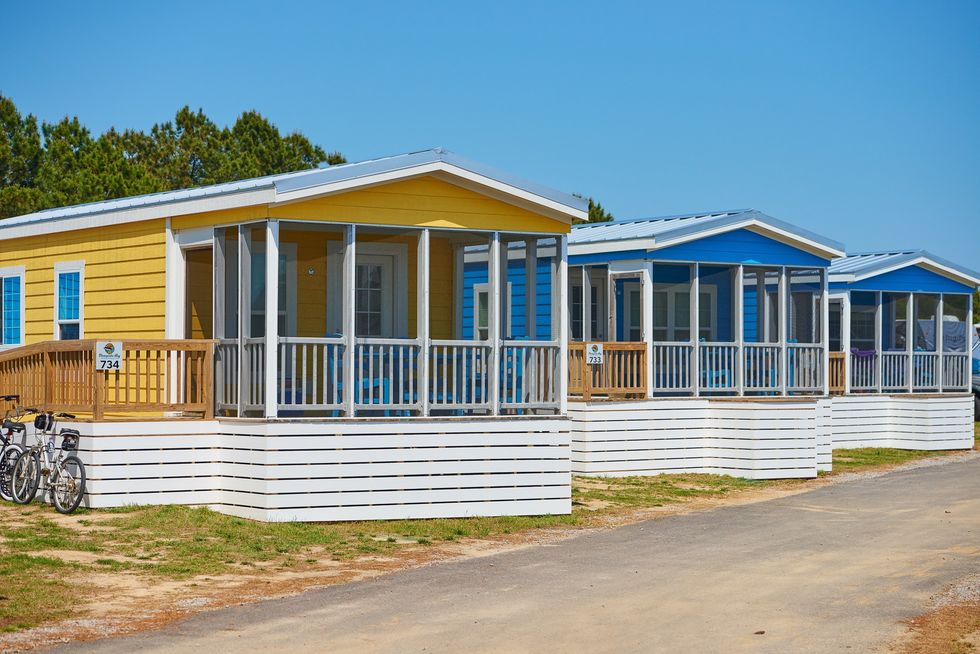
Cabins at Kampgrounds of America's Cape Charles, Va. site
Courtesy of Kampgrounds of America (KOA)
Let’s get into the top-tier features of this camper: It had a master bedroom with a smart TV, a closet, and shelf space. The bathroom had a vanity, cabinet space, and a shower (with an adjustable shower head and hot water with great pressure). There was digital AC and heating in both the bedroom and the front of the camper, along with a dining nook and a kitchen with lots of cabinet space, a full-sized stove, refrigerator, and microwave.
I enjoyed a lot of time in the camper's lounge area with a smart TV and fireplace. The RV was decorated like a modern studio apartment on wheels. There was also a guest room with bunk beds, storage, and games. Outside, there was a retractable awning, LED lights, and a sound system (that played music by the fire pit!)
I stocked my fridge with all my dream camp snacks, hosted an impromptu late-night pow-wow (to bring the party inside during the campsite’s “quiet hours”), and used KOA’s inclusive WiFi access, which was strong and reliable my whole time there.
WHAT I DID: Lodging Options, Town Exploration & Recreation
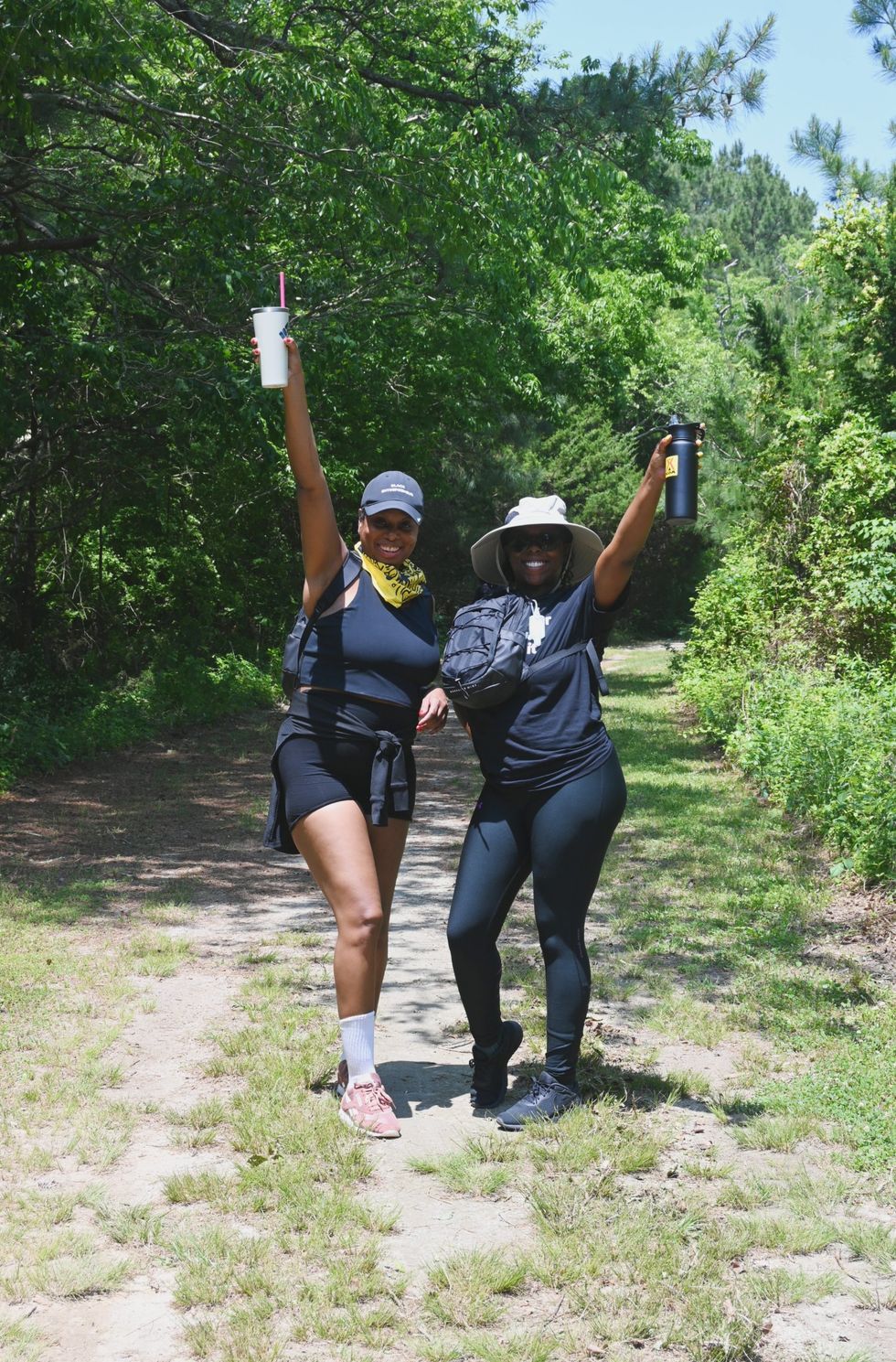
Hiking in Kiptopeke State Park in Cape Charles, Va.
Courtesy
If you don’t want to rent an RV, the Cape Charles KOA campground also offered safari tents (that look just like the ones I saw in South Africa), grass lots to build your own tents and set up, cabins that reminded me of Bermuda cottages, and drive-up options for groups with RVs. There was an on-site pool, private beach access, a beach-side restaurant and bar, and a welcome center that offered souvenirs, information, and snacks.
I also learned how to pitch a tent from scratch (via a completion where my teammate and I won a bottle of sparkling wine), how to start a fire from scratch (a lesson led by Kameron), and the best ways to find a good hiking trail in your community (Kameron and Chev walked us through Kiptopeke State Park, where there are opportunities for bird watching, kayaking, yurt camping, fishing and swimming at the beach.)
And if you want to take things to another level, charter a boat or rent one via a hosting platform or with recommendations from the KOA staff. Go fishing or just enjoy a recreational day out on the Chesapeake Bay.
SAFETY & INCLUSION
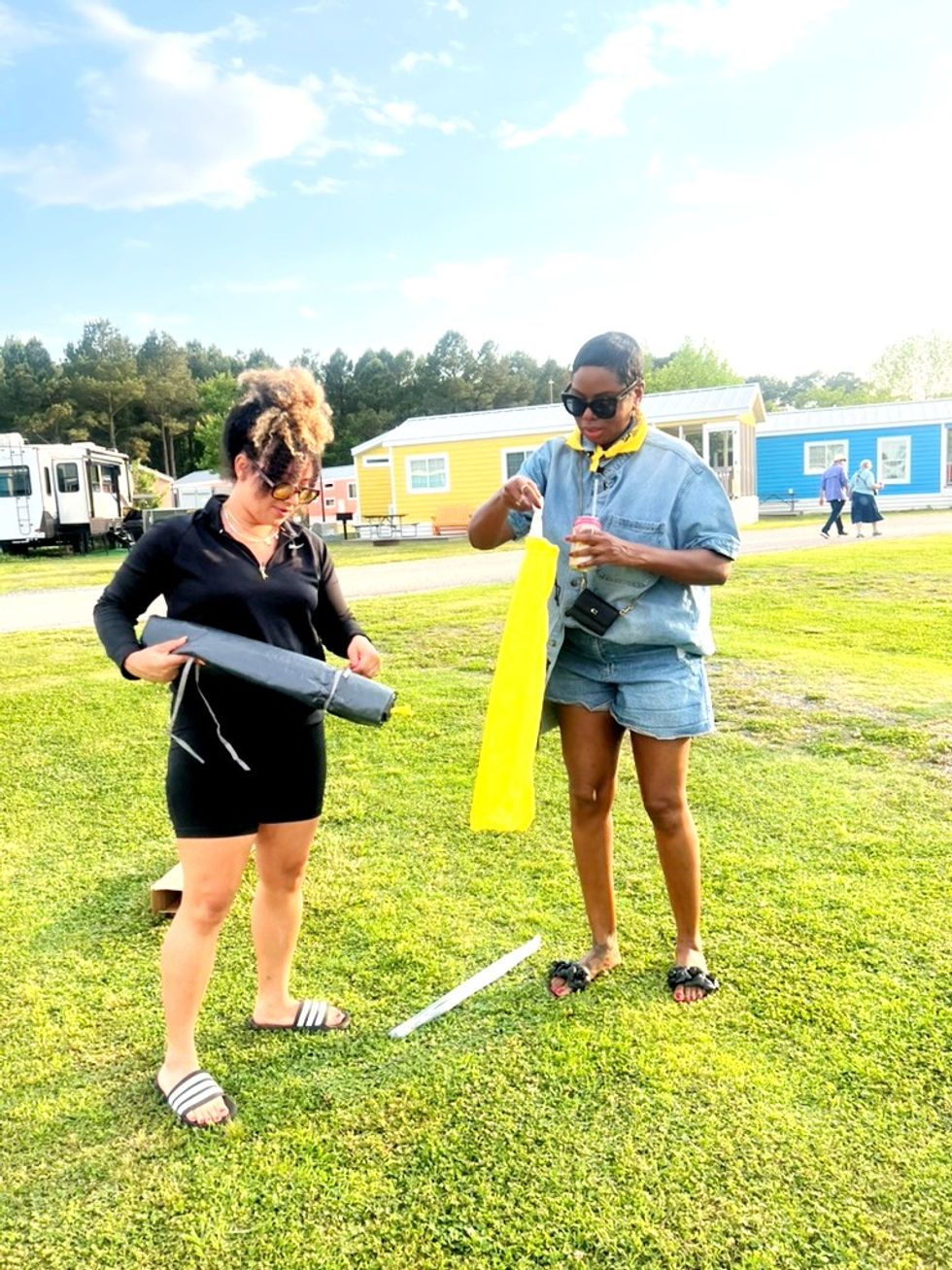
The winning tent-building duo at the KOA campground in Cape Charles, Va.
Courtesy
Now, safety: The whole time, I felt loved and welcome, as the KOA campground in Cape Charles was a secure property that required access cards, had staff readily available day and night, enforced rules on speed limits and quiet hours, and had decent lighting around the grounds. I also felt a sense of peace and rest because nobody really bothered me. Either people were super-friendly or just minded their business, and I didn’t mind that.
There was lots of laughter, ish-talking, roasted s'mores, wine, and dancing among a diverse group of Black women creatives, journalists, PR pros, podcast hosts, and authors—and that brought on a profoundly magical sense of security and connection in and of itself.
Also, camping—as any experience for me, due to my worldview—is what you make it. The KOA staff were super-helpful and personable, Chev cooked divine breakfast tacos and a crab boil with locally sourced seafood, our hosts created a Spotify playlist filled with reggae, dancehall, salsa, R&B and hip-hop hits we all loved, and I even met the owner of the camper, a kind, tatted, middle-aged family man who shared his journey into entrepreneurship and his love for customer service.
We spent the final night of the trip with a little party by the fire pit and a viewing of Super High, a clever animated film about fibroids, cannabis, and self-care by a fellow camper on the trip, Bianca Lambert, and celebrated the upcoming birthday of another amazing media entrepreneur, Nneka M. Okona.
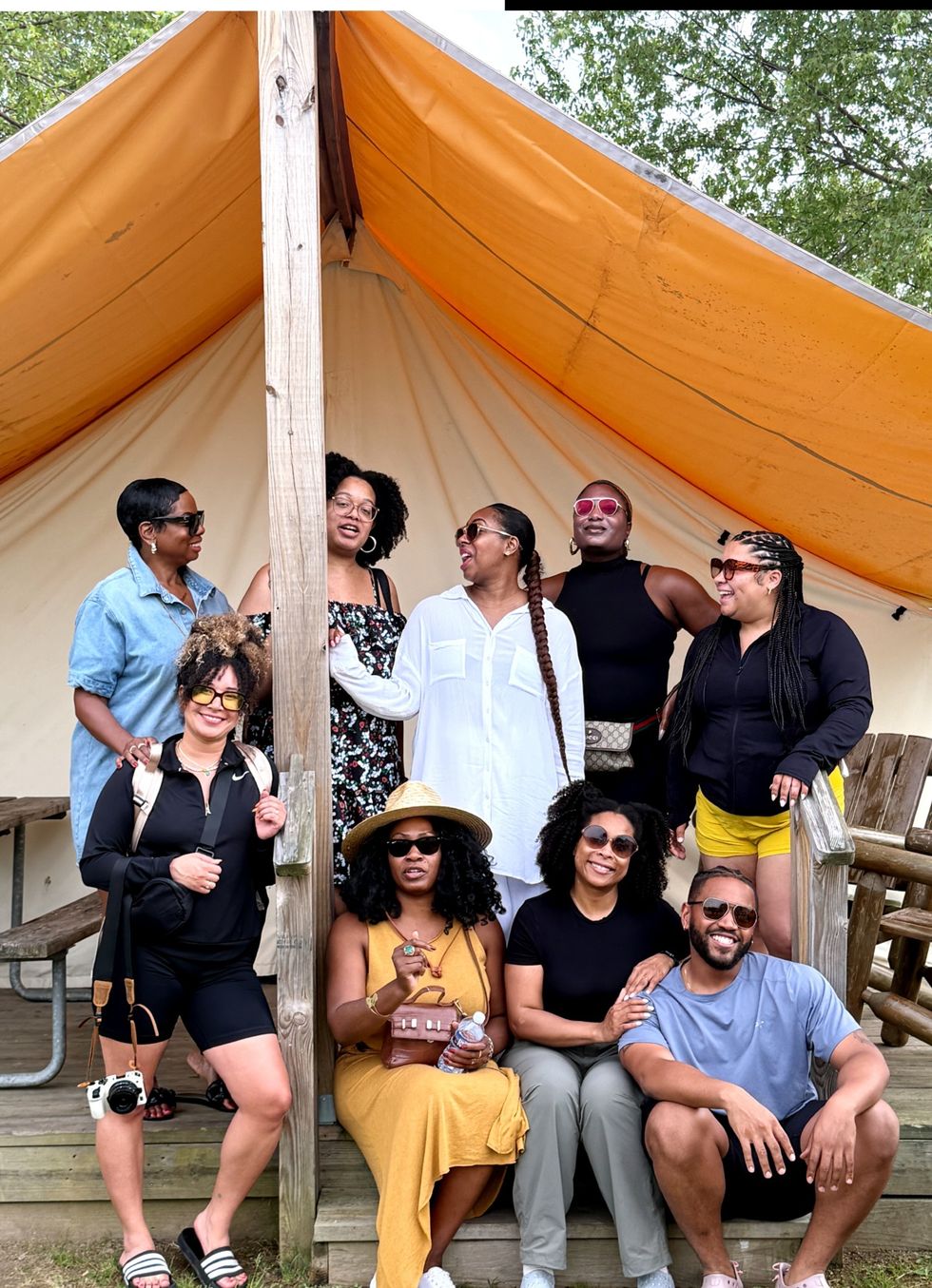
Time well spent with amazing Black creatives, journalists, PR pros, and authors in Cape Charles, Va.
Courtesy
We took a drive into “town,” which for any small community near water is where all the action is. There were breakfast diners, seafood spots right by the water, art galleries, and bars. While there may have been a few blank stares here and there, I found most folk to be friendly enough to return a “Hello,” or a smile. (And those who didn't, I really don't regard as worthy of disturbing my peace and openness to fully enjoy a new experience.)
The shops were diverse both in nature, vibe, and offerings. One shop even had items made in Kenya, Mexico, and Guatemala, and, according to the woman behind the counter, advocates for the women creatives and artisans who made the items.
Camping offers revolutionary rest, freedom, and healing—an act of self-care and reconnection. When Black folk show up in nature, for ourselves and for our communities, it’s powerful, reminding everyone that the mountains, the trees, the oceans, the rivers—they all belong to us, too. It’s now a bucket-list travel adventure I'd gladly repeat.
Let’s make things inbox official! Sign up for the xoNecole newsletter for love, wellness, career, and exclusive content delivered straight to your inbox.
Featured image courtesy of Janell Hazelwood
Exclusive: Viral It Girl Kayla Nicole Is Reclaiming The Mic—And The Narrative
It’s nice to have a podcast when you’re constantly trending online. One week after setting timelines ablaze on Halloween, Kayla Nicole released an episode of her Dear Media pop culture podcast, The Pre-Game, where she took listeners behind the scenes of her viral costume.
The 34-year-old had been torn between dressing up as Beyoncé or Toni Braxton, she says in the episode. She couldn’t decide which version of Bey she’d be, though. Two days before the holiday, she locked in her choice, filming a short recreation of Braxton’s “He Wasn’t Man Enough for Me” music video that has since garnered nearly 6.5M views on TikTok.
Kayla Nicole says she wore a dress that was once worn by Braxton herself for the Halloween costume. “It’s not a secret Toni is more on the petite side. I’m obsessed with all 5’2” of her,” she tells xoNecole via email. “But I’m 5’10'' and not missing any meals, honey, so to my surprise, when I got the dress and it actually fit, I knew it was destiny.”
The episode was the perfect way for the multihyphenate to take control of her own narrative. By addressing the viral moment on her own platform, she was able to stir the conversation and keep the focus on her adoration for Braxton, an artist she says she grew up listening to and who still makes her most-played playlist every year. Elsewhere, she likely would’ve received questions about whether or not the costume was a subliminal aimed at her ex-boyfriend and his pop star fiancée. “I think that people will try to project their own narratives, right?” she said, hinting at this in the episode. “But, for me personally – I think it’s very important to say this in this moment – I’m not in the business of tearing other women down. I’m in the business of celebrating them.”
Kayla Nicole is among xoNecole’s It Girl 100 Class of 2025, powered by SheaMoisture, recognized in the Viral Voices category for her work in media and the trends she sets on our timelines, all while prioritizing her own mental and physical health. As she puts it: “Yes, I’m curating conversations on my podcast The Pre-Game, and cultivating community with my wellness brand Tribe Therepē.”
Despite being the frequent topic of conversation online, Kayla Nicole says she’s learning to take advantage of her growing social media platform without becoming consumed by it. “I refuse to let the internet consume me. It’s supposed to be a resource and tool for connection, so if it becomes anything beyond that I will log out,” she says.
On The Pre-Game, which launched earlier this year, she has positioned herself as listeners “homegirl.” “There’s definitely a delicate dance between being genuine and oversharing, and I’ve had to learn that the hard way. Now I share from a place of reflection, not reaction,” she says. “If it can help someone feel seen or less alone, I’ll talk about it within reason. But I’ve certainly learned to protect parts of my life that I cherish most. I share what serves connection but doesn’t cost me peace.
"I refuse to let the internet consume me. It’s supposed to be a resource and tool for connection, so if it becomes anything beyond that I will log out."

Credit: Malcolm Roberson
Throughout each episode, she sips a cocktail and addresses trending topics (even when they involve herself). It’s a platform the Pepperdine University alumnus has been preparing to have since she graduated with a degree in broadcast journalism, with a concentration in political science.
“I just knew I was going to end up on a local news network at the head anchor table, breaking high speed chases, and tossing it to the weather girl,” she says. Instead, she ended up working as an assistant at TMZ before covering sports as a freelance reporter. (She’s said she didn’t work for ESPN, despite previous reports saying otherwise.) The Pre-Game combines her love for pop culture and sports in a way that once felt inaccessible to her in traditional media.
She’s not just a podcaster, though. When she’s not behind the mic, taking acting classes or making her New York Fashion Week debut, Kayla Nicole is also busy elevating her wellness brand Tribe Therepē, where she shares her workouts and the workout equipment that helps her look chic while staying fit. She says the brand will add apparel to its line up in early 2026.
“Tribe Therepē has evolved into exactly what I have always envisioned. A community of women who care about being fit not just for the aesthetic, but for their mental and emotional well-being too. It’s grounded. It’s feminine. It’s strong,” she says. “And honestly, it's a reflection of where I am in my life right now. I feel so damn good - mentally, emotionally, and physically. And I am grateful to be in a space where I can pour that love and light back into the community that continues to pour into me.”
Tap into the full It Girl 100 Class of 2025 and meet all the women changing game this year and beyond. See the full list here.
Featured image by Malcolm Roberson
This Is How To Keep 'Holiday Season Stress' From Infecting Your Relationship
Hmph. Maybe it’s just me, but it seems like there is something really weird happening in the fall season air (because winter doesn’t officially begin until December 21) that cuddle season is in full swing while break-up season is as well. In fact, did you know that break-ups are so popular during the holiday season that December 11 is deemed Break-Up Day?
The reasons why relationships shift around this time vary; however, I did both roll my eyes and chuckle when I read that a very popular one is because it’s an easy way to get out of getting one’s significant other a Christmas present. SMDH.
Anyway, I personally think that the less shallow folks out here may contemplate calling things “quits” or they at least distance themselves a bit from their partner (and what I’m referring to is serious relationships) due to all of the stress and strain that oftentimes comes with the holidays whether it be financial, familial, due to their tight schedules or something else.
Listen, I would hate for you and your man to miss the fun and happiness of experiencing this time of year, all because you are so overwhelmed or irritated that you can’t really enjoy it. That’s why I have a few practical tips for how to avoid allowing the typical holiday season stress from INFECTING your relationship.
Manage Your Expectations
 Giphy
GiphyUnmanaged expectations. If there is a main reason why the holiday season tends to be so stress-filled for so many people, I’d bet good money that this is the cause. And when you’re in a long-term relationship, expectations can manifest themselves in all sorts of cryptic and/or unexpected ways. You might have relatives who assume that you are going to be with them for Thanksgiving or Christmas when you have other plans in mind. You might be thinking that you are going to spend one amount for presents while your man is thinking something totally different. When it comes to scheduling, your signals may be crossed.
And you know what? To all of these scenarios, this is where clear and consistent communication come in. Don’t assume anything. Don’t dictate anything either. From now until New Year’s, mutually decide to check in once a week, just to make sure that you are both on the same page as it relates to the holidays and what you both are thinking will come along with it. The less blindsided you both feel, the less stressed out you will be. Trust me on this.
Set (and Keep) a Budget
 Giphy
GiphyOkay, so I read that last year, 36 percent of Americans incurred some type of holiday-related debt. Hmph. Last year, there was still some sense of normalcy in this country, chile, so I can only imagine what finances are gonna look like over the next several weeks. That said, since I don’t know a lot of people who don’t find being broke stressful, make sure that you and your bae set a budget and then stick to it this year — no ifs, ands or buts.
Because really, y’all — it doesn’t make sense to deplete savings and/or max out credit cards for a few days of giggles only to be damn near losing your mind because you don’t know how to make ends meet come Dr. Martin Luther King, Jr. Day.
And by the way, this tip doesn’t just speak to things like food and gifts; I also mean travel. If it doesn’t make a ton of sense (or cents) to be all over the place this year — DON’T BE.
Keep Matthew 5:37 at the Forefront
 Giphy
GiphyIf off the top of your head, you don’t know what Matthew 5:37 says, no worries, here ya go: “But let your ‘Yes’ be ‘Yes,’ and your ‘No,’ ‘No.’ For whatever is more than these is from the evil one.” That verse right there? Oh, it’s a boundaries lifesaver! I say that because do you see “maybe” or “I’ll think about it” in there? Nope. LOL. It says that you should tell people “yes” or “no” and leave it at that — and that complements Anne Lamott’s quote, “’No’ is a complete sentence” impeccably well. Yeah, you’ve got to remember that anything beyond a yes or no to a request is privileged information; you don’t owe anyone details or an explanation.
Besides, if you are really honest with yourself, when someone asks you something and you give a “Umm, let me think about it” kind of reply, more times than not, you already know what your answer is going to be — so why not let you both off of the hook? Give your response. Commit to that. And let everyone (including yourself) get on with their lives and schedules.
I promise you that when it comes to those holiday parties, you are pissing more folks off by not RSVP’ing or doing so and not showing up than just saying, “Thank you but not this year” off the rip.
Remember That Your Personal Space Is Privilege Not a Right
 Giphy
GiphyA friend of mine recently bought a new house and invited me over to come see it. He’s a single man with no children, so as I was taking in all of the space that he had, especially as I walked through his finished basement, I joked about relatives coming to live with him. “Hell no” and “absolutely not” were pretty much his immediate responses as he went on to say that some folks even had the nerve to be offended when he told them that he had no intentions on taking DNA in.
Ain’t it wild how people think that your stuff is their right? And yes, that brings me to my next point. Your home is your sanctuary space. If you want to host folks this year — cool. If not, ALSO COOL. Please don’t let folks (family included) guilt you into how they want you to act or even into what they would do if the shoe was on the other foot. You are not them — and as one of my favorite quotes states, “If two people were exactly alike, one of them would be unnecessary.” (A man by the name Larry Dixon said that.)
Hell, my friends? They know that I am good for sending them random things that they need or even want all throughout the year. Coming over to hang out at my pace, though. Uh-uh. Chalk it up to being a card-carrying member of the ambivert club yet I like keeping my living space personal — and I sleep like a baby, each and every night, for feeling that way.
Always remember that your space, your time, your resources, your energy and shoot, yourself period (including your relationship), are all things that are your own. You get to choose how, when and why you want to share them. The holiday season is certainly no exception.
Cultivate Some “You Two Only” Traditions
 Giphy
GiphyIt’s not uncommon for some couples to hit me up after the holiday season to “detox.” Sometimes it’s due to the financial drama (and sometimes trauma) that they experienced. Sometimes it’s because they allowed their relatives (especially in-laws) to get more into their personal business than they should’ve. More than anything, though, it tends to be because they didn’t get enough quality time together and so ended up feeling “disconnected.”
Please don’t let that happen. Listen, I’m not even a holidays kind of woman and yet, I will absolutely sit myself down with some hot chocolate and chocolate chip cookies to enjoy a Hallmark holiday film or two. Aside from the fact that most of them are lighthearted and sweet, I also like that they usually focus on couples loving on each other amidst all of the holiday beauty and ambiance — which is something that all couples should set aside some time to do.
Maybe it’s a vacation. Maybe it’s a staycation. Or maybe it’s my personal favorite, A SEXCATION. Whether it’s for a few days, the weekend or even overnight — don’t you let the holidays go by without setting aside time for you and your man to celebrate one another. Don’t you dare (check out “Are You Ready To Have Some Very Merry 'Christmas Sex'?”).
GET. SOME. REST.
 Giphy
GiphyI once read that 8 out of 10 people get stressed out over the holidays and 3 out of 10 lose sleep during to it — and when you’re stress-filled and sleep-deprived, that can absolutely lead to hypersensitivity, making mountains out of molehills and even not being in the mood for sex.
Your relationship can’t afford to go through any of this, so definitely make sure to prioritize rest. I don’t care how unrealistic it might seem during this time, sleep should never be seen as a luxury; it will always and forever be a great necessity.
That said, try to get no less than six hours of shut-eye in (check out “6 Fascinating Ways Sex And Sleep Definitely Go Hand In Hand”) and even ask your bae to take a nap with you sometimes (check out “Wanna Have Some Next-Level Sex? Take A Nap, Sis.”). Not only will sleep help to restore your mind, body and spirit but, when it’s with your partner, it’s an act of intimacy that can make you both feel super connected, even in the midst of what might feel like chaos.
___
Holiday season stress is real. Still, never give it the permission or power to throw your relationship off. Put you and your man first and let the holidays be what they are gonna be, chile.
Let’s make things inbox official! Sign up for the xoNecole newsletter for love, wellness, career, and exclusive content delivered straight to your inbox.
Featured image by Shutterstock





